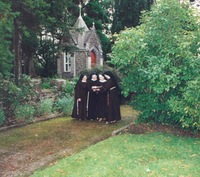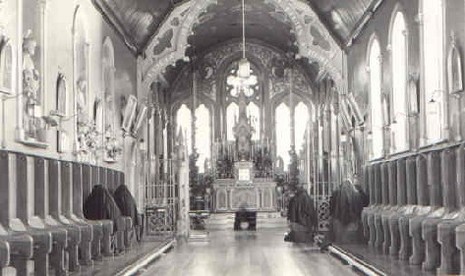140 Years of Eucharistic Adoration in Ireland
I had just finished the Invitatory at Vigils this morning when I heard the telephone ringing. Normally, I don’t answer the telephone during the Divine Office, but given the very early hour I feared some kind of emergency and so interrupted the Office to answer. I was reassured when, at the other end, I heard the lovely, lilting voice of Reverend Mother M. Angela, abbess of the Poor Clares of Perpetual Adoration in Drumshanbo, County Leitrim, Ireland. Two years ago I had the privilege of preaching the annual retreat to the nuns of Drumshanbo. Their little monastery is, to my mind, one of the holiest places in Ireland!
Two of the Drumshanbo community’s founding members were English ladies, converts from the Church of England: Elizabeth Sophie Law, and Mary Anne Hayes. A third member of the original group, Frances Maria Horne, was the daughter of a British military office and a Catholic mother. After their reception into the Catholic Church in 1851 the three ladies went to Paris to be formed in the austere Monastery of Saint Elizabeth of the so-called “Third Order of Strict Observance of the Reform of Picpus.” A pilgrimage from one temporary monastery to another — first in England and then in Ireland — followed until, at last, in 1864 the little flock found a permanent home on the hillside in County Leitrim where they are to this day.

Mother Angela rang to remind me that today is the 140th anniversary of the beginning of Eucharistic Adoration by the Drumshanbo community. For 140 years their adoration has been uninterrupted! Today is also the 130th liturgical anniversary of the death of the saintly Reverend Mother St. Joseph, Drumshanbo’s second abbess; Our Lord called her to Himself on the eve of Corpus Christ, 11 June, 1879.
On one occasion, speaking in a rapture of Divine Love, Mother St. Joseph said to a witness:
. . . that Our Divine Lord wished the Devotion to the Most Blessed Sacrament to be increased over the whole world; that we were to have Perpetual Adoration and Exposition of the Most Blessed Sacrament in our Convent Chapel; that we should be the Adorers to keep watch, hour by hour, day and night, before the Most Holy; that a high Tower should be built, and that the Bell should toll every hour, one, two, three; and that men’s hearts should be touched thereby; that ladies would furnish the pecuniary aid necessary for the Perpetual Adoration which implied Exposition. She also told me that our Constitutions brought from France should be revised and sent to Rome. . . .
Our Divine Lord also spoke about the Churches of Ireland — that poverty prevented the Blessed Sacrament being reserved in the Tabernacle [in many cases]; but He wished His priests to be zealous for the adornment of the Sanctuary, and that they would thus minister to Him personally. No heed should be paid to those who murmured against what they would term ‘this waste,’ as the Pharisees had murmured that the price of the precious ointment was not given to the poor — adding that the multitude see and compassionate the wants of the Poor, but the enlightened soul of the consecrated spouse best discovers the needs of her Lord!
Our Divine Lord again made know to our dear Mother St. Joseph that great blessings would descend upon our country through means of Devotion to the Most Blessed Sacrament — that external demonstrations and the decoration of Churches honoured Him, and that even regal honours should be paid Him as a King upon His Throne in the Sacrament of His Love; . . . that the Jews would be converted and acknowledge Our Lord in the Most Blessed Sacrament to be their King and their God.
With Mother St. Joseph interceding for the Church in Ireland from her place in heaven, and her faithful daughters, though now they be few in number and rich in years, praying before the Most Blessed Sacrament in their chapel in Leitrim, one has reason to rejoice in hope, even when, from a human perspective, everything there seems to point to an alarming crisis of faith.
Sing praise to the Lord, then, faithful souls,
invoke His name with thankfulness.
For a moment lasts His anger, for a life-time His love;
sorrow is but the guest of a night, and joy comes in the morning.
I, too, had thought, in time of ease, Nothing can shake me now;
such power and state, Lord, had Thy mercy granted me.
Then Thou didst turn thy face away from me,
and I was at peace no more.
Lord, I was fain to plead with Thee,
cry upon my God for pity:
How will it profit Thee to take my life? I can but go down into the grave;
and will this dust give thanks to Thee, or acknowledge, there, Thy faithfulness?
Listen, Lord, and spare;
Lord, let Thy aid befriend me.
With that, Thou didst turn my sadness into rejoicing;
Thou hast undone the sackcloth I wore, and girded me about with gladness.So may this heart never tire of singing praises;
O Lord my God I will give thanks to Thee for ever.
Psalm 29, Translation by R. Knox


I’m from Drumshanbo, Co’ Leitrim – born in 1944. Now aged 66, I served the 07:30 mass in this convent from age 7 through 12. It was then an enclosed order of perpetual adoration of the Franciscan nuns. It is now run by the Poor Clare order.
In all the time I knew them, I never met any of the nuns face-to-face – all communications were conducted through a curtained grille and, if any vestments or altar fitments were required, they were provided to me via a turntable beside the grille.
The innocence of the ladies with whom I dealt “shone” through – even as I child, I wondered at the lack of worldliness and the “simplicity” of those beautiful people.
We had some winters that were only awful, but I never missed a single mass, whatever the weather – it was a long mile from my home and it was strictly “shank’s mare” for transportation. You cannot imagine how fabulous a simple cup of tea and a biscuit tasted after mass on some of those inclement mornings – all delivered, naturally, via the ubiquitous turntable.
Should anyone in any house in the vicinity of Drumshanbo fall seriously ill or should any farm animal be in trouble, more reliance was placed in the nuns “storming of heaven” with prayer during their vigils than was ever placed on the local doctor or vet.
My lady sacristan, whose name (I am ashamed to say) I cannot bring to mind once asked me if there really were people inside that silver thing that some of her sisters had seen in the sky – how could it be so. Remember that these folks had cloistered themselves into isolation – no newspapers, no radio, no visitors from the outside world except for one family visit per annum. They completely abandoned the world for a life of penitence and adoration.
I had the honour to serve mass at the funeral of my lady sacristan – she was 86 years of age and had been inside the convent since about the age of 14. Sadly, on inclement mornings thereafter, the tea and biscuit custom did not pass on from her to her successor.
I visited the convent in the mid ’90s – I was making a trip of nostalgia and, believe you me, it was with great sadness that I observed that the community had dwindled in numbers to almost nothing – those there were now all “well-on” in years and vocations had dried up. To a layman, the most noticeable evidence of this was the “lightness” and “reediness” of the chanted vespers when compared with it’s former glory days.
I don’t quite know just how or why I came across your article – I was actually browsing for the words of Joseph Mary Plunkett’s Easter Rising 1916 poem – “I see His blood upon the rose” – for a CD/DVD I’m making for my sister’s birthday and somehow I stumbled into your site. The trip that resulted down memory lane has been extraordinary and, I have to confess, I’ve thoroughly enjoyed it.
Thank you for taking the time to read my musings – I can only hope they didn’t “bore the socks” off you – anyway, I’m fairly sure you would be much too polite to tell me even if it were so.
With regards, Eamonn Giblin
Dear Eamonn, Your letter delighted me! God willing, I will be in Drumshanbo this coming August, at least for a few days. It has become something of annual pilgrimage: Knock and Drumshanbo. I have an 86 year old cousin living in Carrick-on-Shannon whom I will also be looking in on. My grandmother spent part of her girlhood on the family farm in Finisklin. Thank you very much for writing such a splendid reminiscence of your experiences at the Convent in Drumshanbo. Father Mark